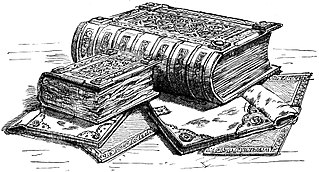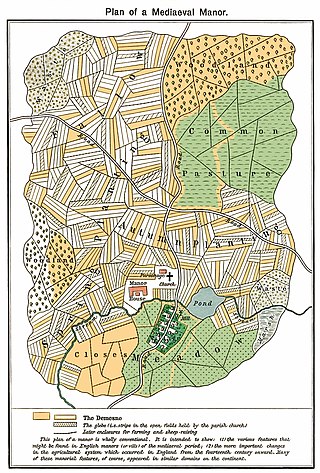
Manorialism, also known as seigneurialism, the manor system or manorial system, was the method of land ownership in parts of Europe, notably France and later England, during the Middle Ages. Its defining features included a large, sometimes fortified manor house in which the lord of the manor and his dependents lived and administered a rural estate, and a population of labourers who worked the surrounding land to support themselves and the lord. These labourers fulfilled their obligations with labour time or in-kind produce at first, and later by cash payment as commercial activity increased. Manorialism was part of the feudal system.

Domesday Book – the Middle English spelling of "Doomsday Book" – is a manuscript record of the "Great Survey" of much of England and parts of Wales completed in 1086 at the behest of King William I, known as William the Conqueror. The manuscript was originally known by the Latin name Liber de Wintonia, meaning "Book of Winchester", where it was originally kept in the royal treasury. The Anglo-Saxon Chronicle states that in 1085 the king sent his agents to survey every shire in England, to list his holdings and dues owed to him.

Copyhold was a form of customary land ownership common from the Late Middle Ages into modern times in England. The name for this type of land tenure is derived from the act of giving a copy of the relevant title deed that is recorded in the manorial court roll to the tenant; not the actual land deed itself. The legal owner of the manor land remained the mesne lord, who was legally the copyholder, according to the titles and customs written down in the manorial roll. In return for being given land, a copyhold tenant was required to carry out specific manorial duties or services. The specific rights and duties of copyhold tenants varied greatly from one manor to another and many were established by custom. By the 19th century, many customary duties had been replaced with the payment of rent.

Serfdom was the status of many peasants under feudalism, specifically relating to manorialism, and similar systems. It was a condition of debt bondage and indentured servitude with similarities to and differences from slavery, which developed during the Late Antiquity and Early Middle Ages in Europe and lasted in some countries until the mid-19th century.

The open-field system was the prevalent agricultural system in much of Europe during the Middle Ages and lasted into the 20th century in Russia, Iran, and Turkey. Each manor or village had two or three large fields, usually several hundred acres each, which were divided into many narrow strips of land. The strips or selions were cultivated by peasants, often called tenants or serfs. The holdings of a manor also included woodland, often managed through coppicing, and pasture areas for common usage and fields belonging to the lord of the manor and the religious authorities, usually Roman Catholics in medieval Western Europe. The farmers customarily lived in separate houses in a nucleated village with a much larger manor house and church nearby. The open-field system necessitated co-operation among the residents of the manor.

Enclosure or Inclosure is a term, used in English landownership, that refers to the appropriation of "waste" or "common land" enclosing it and by doing so depriving commoners of their rights of access and privilege. Agreements to enclose land could be either through a formal or informal process. The process could normally be accomplished in three ways. First there was the creation of "closes", taken out of larger common fields by their owners. Secondly, there was enclosure by proprietors, owners who acted together, usually small farmers or squires, leading to the enclosure of whole parishes. Finally there were enclosures by Acts of Parliament.

Lord of the manor is a title that, in Anglo-Saxon England, referred to the landholder of a rural estate. The lord enjoyed manorial rights as well as seignory, the right to grant or draw benefit from the estate. The title continues in modern England and Wales as a legally recognised form of property that can be held independently of its historical rights. It may belong entirely to one person or be a moiety shared with other people.

A manor house was historically the main residence of the lord of the manor. The house formed the administrative centre of a manor in the European feudal system; within its great hall were held the lord's manorial courts, communal meals with manorial tenants and great banquets. The term is today loosely applied to various country houses, frequently dating from the Late Middle Ages, which formerly housed the landed gentry.
Heriot, from Old English heregeat ("war-gear"), was originally a death-duty in late Anglo-Saxon England, which required that at death, a nobleman provided to his king a given set of military equipment, often including horses, swords, shields, spears and helmets. It later developed into a kind of tenurial feudal relief due from villeins. The equivalent term in French was droit du meilleur catel.
The Inclosure Acts,, cover enclosure of open fields and common land in England and Wales, creating legal property rights to land previously held in common. Between 1604 and 1914, over 5,200 individual enclosure acts were passed, affecting 28,000 km2.

In medieval and early modern Europe, a tenant-in-chief was a person who held his lands under various forms of feudal land tenure directly from the king or territorial prince to whom he did homage, as opposed to holding them from another nobleman or senior member of the clergy. The tenure was one which denoted great honour, but also carried heavy responsibilities. The tenants-in-chief were originally responsible for providing knights and soldiers for the king's feudal army.

A mesne lord was a lord in the feudal system who had vassals who held land from him, but who was himself the vassal of a higher lord. Owing to Quia Emptores, the concept of a mesne lordship technically still exists today: the partitioning of the lord of the manor's estate among co-heirs creating the mesne lordships.
"Free bench" is a legal term referring to an ancient manorial custom in parts of England whereby a widow, until she remarried, could retain tenure of her late husband's land.

The manorial courts were the lowest courts of law in England during the feudal period. They had a civil jurisdiction limited both in subject matter and geography. They dealt with matters over which the lord of the manor had jurisdiction, primarily torts, local contracts and land tenure, and their powers only extended to those who lived within the lands of the manor: the demesne and such lands as the lord had enfeoffed to others, and to those who held land therein. Historians have divided manorial courts into those that were primarily seignorial – based on feudal responsibilities – and those based on separate delegation of authority from the monarch. There were three types of manorial court: the court of the honour; the court baron; and the court customary, also known as the halmote court.

A heerlijkheid was a landed estate that served as the lowest administrative and judicial unit in rural areas in the Dutch-speaking Low Countries before 1800. It originated as a unit of lordship under the feudal system during the Middle Ages. The English equivalents are manor, seigniory and lordship. The German equivalent is Herrschaft. The heerlijkheid system was the Dutch version of manorialism that prevailed in the Low Countries and was the precursor to the modern municipality system in the Netherlands and Flemish Belgium.
A custumal is a medieval-English document that stipulates the economic, political, and social customs of a manor or town. It is common for it to include an inventory of customs, regular agricultural, trading and financial activities as well as local laws. It could be written for one manor or a whole county.

Feudalism as practiced in the Kingdoms of England during the medieval period was a state of human society that organized political and military leadership and force around a stratified formal structure based on land tenure. As a military defence and socio-economic paradigm designed to direct the wealth of the land to the king while it levied military troops to his causes, feudal society was ordered around relationships derived from the holding of land. Such landholdings are termed fiefdoms, traders, fiefs, or fees.
William Rosewell was a gentleman and landholder of Loxton, Somerset, England. He was the father of William Rosewell the Solicitor-General to Queen Elizabeth I. He was named as one of the trustee in his son's will of 1566 and managed his son's estates in Somerset while his son's children were under age.

St Mary's Church is a Grade II listed Anglican parish church in the village of Wix, Essex, England. Formerly associated with a priory from the Middle Ages, the present church dates largely from the 18th century.
Peasant homes in medieval England were centered around the hearth while some larger homes may have had separate areas for food processing like brewhouses and bakehouses, and storage areas like barns and granaries. There was almost always a fire burning, sometimes left covered at night, because it was easier than relighting the fire.







